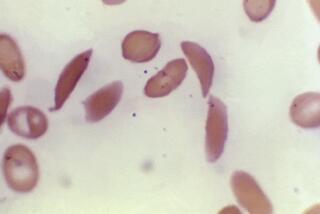New Therapy Offers Hope for the Immune-Impaired : Health: Bioengineered interferon helps those with a rare condition resist infections. It may do the same for patients who have AIDS or burns.
WASHINGTON — A new drug has brought dramatic success in treating a rare, life-threatening immune-deficiency disorder and may be a valuable therapy for numerous other immune disorders, federal health officials said Wednesday.
Researchers said that regular injections of recombinant gamma interferon can prevent serious infections and other complications of chronic granulomatous disease, or CGD, a hereditary condition of about 4,000 people worldwide.
The scientists said they are hopeful that the drug will help others with compromised immune systems, such as AIDS patients, newborns, chemotherapy patients, the elderly and burn victims.
“These findings are important not only because they will help children with CGD,” said Dr. John I. Gallin, director of the division of intramural research for the National Institute of Allergy and Infectious Diseases and a principal investigator in the study.
“We know it clearly works in one disease,” he told a press conference. “We are optimistic it will be useful in other diseases.”
The report, published in today’s New England Journal of Medicine, said therapy with gamma interferon reduced the frequency of serious infections by about 70%, or twice as well as antibiotics.
The drug, a bioengineered form of an immune-boosting substance produced naturally by the body, was approved for CGD in December by the Food and Drug Administration. It is made by Genentech Inc. of South San Francisco.
In CGD, white blood cells called phagocytes, which attack invading fungi and bacteria, are unable to produce the hydrogen peroxide that kills the microbes because of a defective or missing protein. As a result, people with CGD are left especially vulnerable to critical infections.
Before 1970, many children with CGD did not live past age 10. Antibiotic therapy, introduced in the 1980s, helped reduce bacterial infections but not fungoid infections, which often require lengthy hospital stays.
The condition also causes inflammatory reactions such as gum disease, grossly enlarged lymph glands and tumor-like masses called granulomas. The granulomas are not malignant, but can cause serious problems by blocking digestive and urinary passages.
In the nine-month study, 128 patients were treated at 13 medical centers around the world, including Scripps Clinic and Research Foundation in La Jolla, Calif.
Researchers said that the gamma interferon “markedly reduced the threat of infections.” Only 14 of 63 patients on the drug developed serious infections, compared to 30 of the 65 who took an inert placebo.
The most striking effects were found among the 52 patients who were younger than 10: Of those on the drug, 81% remained infection-free after one year, compared with 20% of the placebo group.
Until recently, most primary immune-deficiency diseases were treated with antibiotics, gamma globulin to replace antibodies or bone marrow transplants, said Marcia Boyle, president of the Immune Deficiency Foundation.
“Physicians could only fight the infections . . . not the underlying condition,” Boyle said. “(This) . . . represents a significant advancement.”
More to Read
Sign up for Essential California
The most important California stories and recommendations in your inbox every morning.
You may occasionally receive promotional content from the Los Angeles Times.










